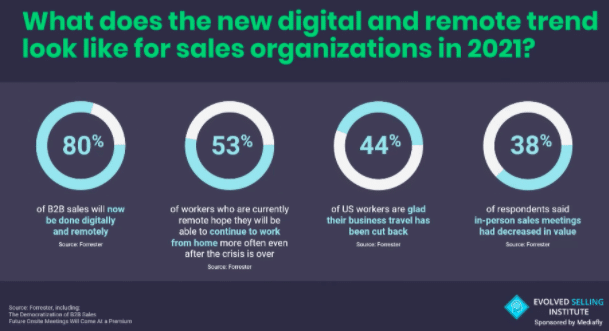Pondering “what things will look like” these days is almost comical, given the lack of predictability businesses (and the planet) have endured in 2020. The challenges of this year were disorienting, often anxiety-producing, but mostly, complicated. Sales organizations are also complicated, made up of individuals with unique characteristics – introverts who flourish from behind the screen in the comforts of their homes and extroverts who crave connection and are easily derailed by underfunctioning technology or the confines of a singular selling space.
This month, we hosted a virtual Evolvers Meet-up titled ‘How to Align Your 2021 Sales Enablement Strategy for Success’, an event that brought together Tom Pisello, Chief Evangelist at Mediafly and Peter Ostrow, VP/Principal Analyst, Sales Enablement Strategies at Forrester Research. During the meet-up, Peter and Tom shared their perspective on both the “new” normal of B2B selling, as well as the “next” normal, concluding that just as challenges and humans are complicated, so is data.

Data matters, but so does the data behind the data. Research from Forrester and Sirius Decisions clearly speaks to the acceleration of digital and remote selling this year and is expected to continue. Yet, change isn’t a new concept, it just comes in large and small packages (we consider this year’s mountain-sized). Pandemic or not, customer interactions are likely to evolve in the future – whether driven by customer needs, your needs, product changes or growth in technology. The question is, do your salespeople have the competencies to manage changes well? In this next normal, there’s a real opportunity for sales enablement to implement practices that solve this.
Digital and Remote Selling Requires Change Management
According to Ostrow, the real headline is, ‘Change management is a severely underleveraged practice.’ For B2B salespeople, it’s not about adapting or reacting to change well, it’s about evolving the way you talk to your customers as a permanent, ongoing practice, not on a project-basis. Start by asking these questions within your organization:
-
- What are your best performers doing to offer the best results? Knowledge and skills are always key players, but what else are your high-performers doing to close deals? How are they utilizing sales enablement practices and tools to make those deeper connections?
- Is your focus sales compensation or sales motivation? The growth of an organization is directly correlated to the growth of individuals. Most important for sellers is the ability to find (and stay in) a growth mindset, which helps them to approach change with curiosity and act on it. Along with already having the necessary skills and knowledge, salespeople can evolve by consuming growth mindset resources like podcasts and books. Are your sellers compensated for outcomes or is compensation associated with how they arrived at those outcomes?
- What types of customer engagements are successful remotely? Some buyers are just more suited to in-person selling and some have successfully migrated to remote interactions. Start by measuring who’s happy – both from a buyer and seller perspective. Are your best performers those that need to be on the road? If not, what’s working online?
What does customer engagement look like in a digital and remote selling environment?
In an environment of such rapid change and unpredictability, enabling sellers with a blueprint for competence is the best case scenario for change. Sure, customer engagements in the “next normal” may be easier because most people are staying home, but the opportunity to make the same mistakes exists – merely showing a product differently just won’t cut it. Online meetings have brought unprecedented intimacy to the buyer/seller interaction (kids, pets, occasional pajamas) and as a result, there’s never been a better time to have more meaningful conversations about what problems your customers are most burdened by and most urgently want to solve. Ask them about what they need.
Yet, this doesn’t mean when customers say, “I just want the demo,” they should just get a demo. The ideal customer engagement – both pre and post-COVID- is one where sellers listen, diagnose and prescribe solutions. Instead of jumping to the demo, ensure your sellers are enabled to use online meetings as interactive discovery tools and have the competencies to ask the right questions and learn what matters most to their customers.
Download the full conversation ‘How to Align Your 2021 Sales Enablement Strategy for Success’ to learn more.

Comments are closed.